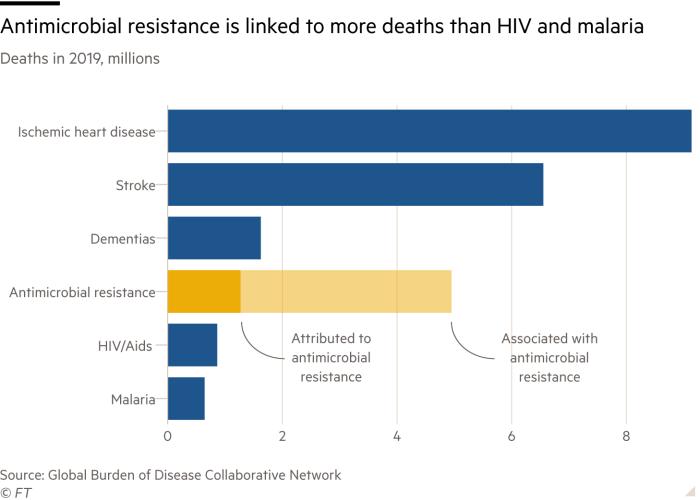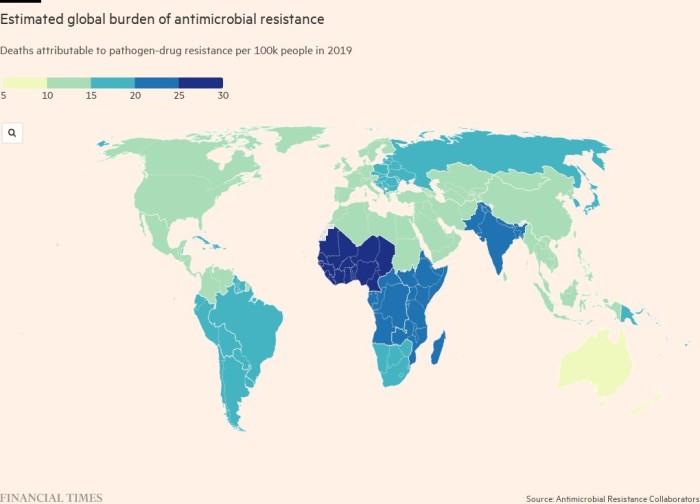
The author is the UK special envoy on antimicrobial resistance, convener at The Trinity Challenge, and England’s former chief medical officer
The world is facing an antimicrobial resistance pandemic. New data last week showed that almost 5m people who died in 2019 suffered from at least one antibiotic-resistant infection, and this trajectory is getting worse.
Like Covid-19 and flu, AMR is complicated and not just limited to humans: animal health, the food chain and the environment are all at risk.
To save lives and economies, we must make progress in the next decade by drawing on the lessons from the current Covid-19 pandemic.
We need broader and better surveillance to help us anticipate problems before it is too late to beat them back. We also need to focus on prevention, diagnosis and effective treatments.
The global scientific community was able to develop Covid-19 vaccines rapidly because they were built on years of earlier investment. Yet, even as our antibiotic medicine cabinet is emptying, research and development is declining.
Why has AMR not inspired the same urgency? Having been labelled as a “pandemic of the future”, the response to it has been hindered by the long lead-in time for developing new medicines.
But global leaders must move faster than the bugs they are trying to beat, to stay one step ahead. We need strong and sustained action from all sectors and levels of society.
Industry must recognise that modern medicine is at risk if it does not urgently restock the global pipeline of antibacterial treatments. The AMR Action Fund, a $1bn public-private partnership, is now preparing to make its first investments into potential antibiotics at the later stages of development.
This can only be the beginning. With potentially game-changing medicines in the pipeline, supported by a groundbreaking financing partnership, now is the time to ensure innovation rises to the challenge.

Global health security, long-term sustainability and financial stability go hand in hand. So investors must support and push industry, too, challenging companies to do more through environmental, social and governance standards.
AMR is material to institutional investors, and we need them to play active roles as antibiotics “stewards” across the biotechnology, pharmaceutical, food production, food retail, healthcare, veterinary and insurance sectors.
Sixteen partners to the Investor Action on AMR initiative — launched by Access to Medicine Foundation, the FAIRR initiative, the Principles for Responsible Investment network and the UK Department of Health and Social Care — are already using their influence to promote innovation and better risk management. They are also lending their voices to galvanise G7 action.
However, other investors are needed around the world to push the initiative, and show that they are on the front foot against the AMR crisis. Investors can learn from climate change and inspire those already making green investments to increase funding to protect modern medicine.
The UK has helped advance the AMR agenda. Under its G7 presidency last year, finance ministers made commitments around antibiotic development and possible incentives for the first time.
The commitments aim to create the right market conditions to strengthen antibiotic product development. They include additional steps to address the market failure that impedes successful new drugs. Examples of these steps include a UK pilot scheme to delink payment for drugs from usage of them, the proposed US Pasteur Act and Germany’s reimbursement programme.
G7 health ministers have additionally committed to pay for antibiotics in ways that reflect the benefits they bring to healthcare systems. This will help to secure a sustainable, accessible and well-stewarded supply of quality drugs that tackle the most dangerous pathogens.
There is hope. The stage is set for long-term multilateral action, informed by lessons from Covid-19 and propelled by ambition and collaboration. Consistent application of the golden trio of innovation, access to drugs and responsible use will drive further progress.
Future G7 and G20 presidencies now have to lead the way to ensure the development of therapies and vaccines, as well as diagnostics to detect and steer appropriate use, accompanied by provisions for equitable, global access and rigorous stewardship.
The new data on the burden of AMR are a wake-up call: a reminder to all countries that they must have national action plans that are funded and being delivered.
We can and should be smart in our objectives, and invest in systemic solutions, such as infection prevention and control; improved sanitation and access to water; and immunisation.
We need to integrate AMR into global agendas for broader pandemic preparedness and prevention, including the potential pandemic treaty under discussion by World Health Organisation member states.
Global action should also reflect the importance of a “One Health” approach, which recognises the interconnections of health with food security and climate change.

AMR is not just a political issue, but one of the greatest health threats to this and future generations. Now is the time for action. Each of us has a role in preventing infections, handling antibiotics responsibly and clamouring for AMR to be treated as the pandemic that it is.
We know that awareness and public engagement are the gateway to political action. We need more of both, especially from and on behalf of marginalised communities and those facing health disparities in the UK and across the world.
We must build a public mandate for policy action. It is time for us all to step up.